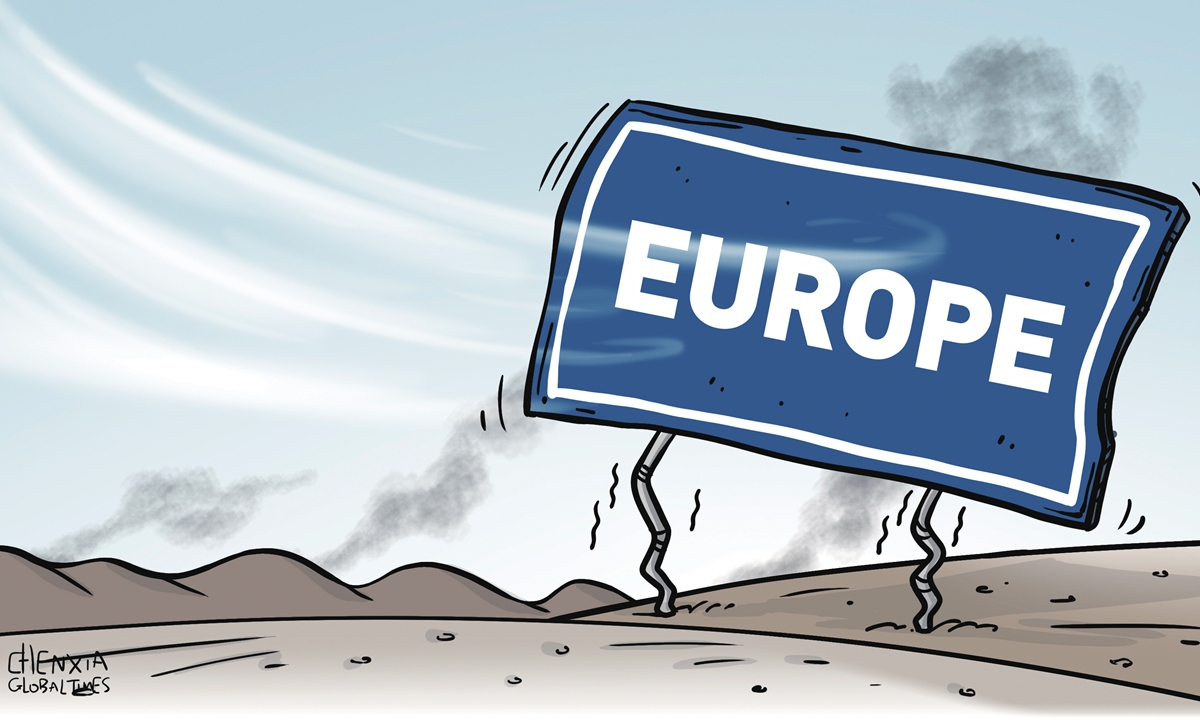
Illustration: Chen Xia/Global Times
European political systems, embroiled in the war in Ukraine and confused about their identity and autonomy, have plunged EU member states into a period of considerable turmoil. The euro area economy is facing significant headwinds. The euro area economy is hampered by high energy costs and is witnessing deindustrialization as energy-intensive industries close down.
How EU member states individually and collectively deal with the current impasse will determine the medium-term prosperity and security of the region's people. Faced with myriad challenges, the EU is showing signs of fragmentation. The ability of the European Commission to build a real and solid sense of common purpose is questionable. This is evident across all major policy vectors, including the war in Ukraine, immigration, and industrial development.
Ukraine's undoubted involvement in the war is now being questioned. The loss of Russia's low-cost gas and oil is like the Harry Potter villain Voldemort. In his recent report to the European Commission on European Competitiveness, Mario Draghi acknowledges the centrality of energy costs, but deliberately ignores the role played by EU and US sanctions on Russian energy. Ta.
Voters are angry about the war's toll on local industry, jobs and the cost of living. More and more people want peace through negotiation. Hungarian and Slovak leaders have voiced their opposition to continuing the war, despite facing intense pressure from mainstream politics. The dominant establishment position from Brussels is to continue supplying arms to the Ukrainians.
The division is clear. It's not just among political leaders. An estimated more than 6 million Ukrainians have fled to Europe since Russia's special military operation in February 2022. Although initially welcomed, there are increasing signs that refugees are beginning to overstay their welcome.
The Ukraine conflict and Europe's economic problems are interconnected, resulting in increasingly high energy costs. The German economy has been in a long-term stagnation. Despite being the heart of European industry, the situation in other parts of the eurozone is not much better. The eurozone as a whole is expected to achieve GDP growth of around 1% this year. Economic hardship and concerns about immigration are causing voters to turn to anti-immigrant and anti-war candidates.
European countries' reactions to proposed tariffs on Chinese-made electric vehicles (EVs) are further evidence of growing rifts across the region. The European Commission has launched a private investigation into alleged subsidies to Chinese manufacturers, resulting in a range of tariff proposals. In a vote of 27 member states, the tariff proposal was supported by 10 countries. Five people opposed the tariffs and 12 abstained. Despite the overwhelming majority of member states not supporting tariffs, the European Commission proceeded to impose them anyway.
Although the UK is no longer a member of the EU, it also faces economic challenges. The New Labor government's austerity measures are likely to exacerbate economic hardship rather than alleviate it, and have already led to the collapse of the government's public standing.
Divided on important issues, European countries and the EU generally face an uncertain future. The economic situation is dire for many. The social embodiment of these issues, particularly the growing hostility towards immigrants, fosters a frenzied political environment that destabilizes institutions and elites. Without a solution to the problem, namely the lack of energy competitiveness, European economic policy is likely to be fragmented. Without a coherent long-term vision, tensions between protectionists and others are likely to continue for some time.
French President Emmanuel Macron once said that Europe is not a geopolitical priority for the United States. As before, Mr Macron laments the loss of European autonomy. And, as before, little appears to be clear about the root causes of Europe's confusion and discomfort. On the other hand, the socio-political situation across Western Europe could become even more unstable as a result.
The author is an adjunct professor at the Queensland University of Technology, a senior research fellow at the Taiwa Institute, and a former advisor to former Australian Prime Minister Kevin Rudd. opinion@globaltimes.com.cn

